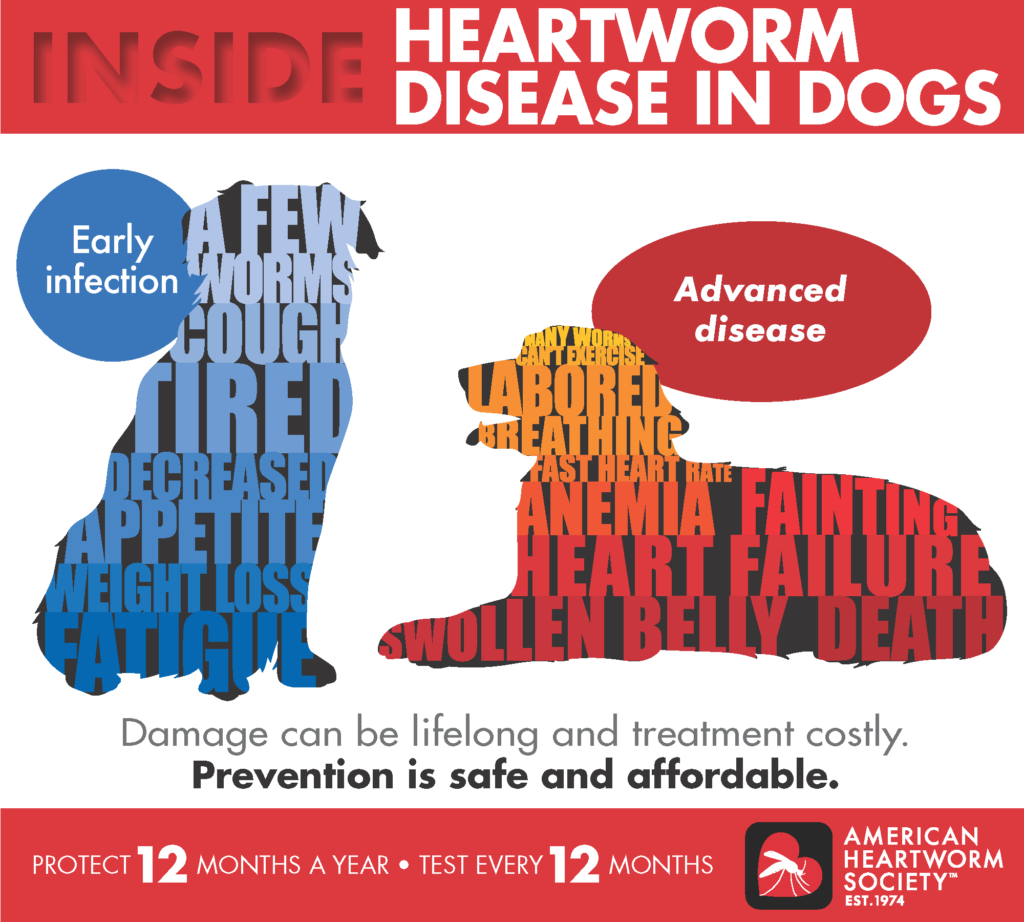What is Heartworm Disease?
Heartworm disease is a dangerous and potentially deadly condition that affects
approximately 1 million dogs annually, according to the American Heartworm Society
(report 2014). It has now been reported in all 50 states likely due to increase in
mosquito population and owner/pet travel. Every year more dogs are diagnosed,
making prevention more important than ever.

Heartworm is a parasitic worm transmitted by mosquitoes that live in the pulmonary
(lung) arteries of the animal. Presence of the worms causes inflammation and the
vascular tissue to become thick and rough. Damage to the vascular system can occur
quickly and may be permanent. Upon initial infection, dogs may appear healthy even
though their system is becoming damaged. By the time clinical signs become apparent,
serious damage may have already occurred. Clinical signs include coughing, exercise
intolerance, lethargy, weight loss, and decreased appetite. More severe damage
includes enlarged heart, congestive heart failure, and/or an obstruction of one of the
heart valves. Damage can easily become life threatening.
Prevention Is Key
Prior to starting heartworm preventative, it is necessary to perform a heartworm test.
This test is performed yearly at around the same time medication is to be renewed. The
purpose of this test is to determine if your pet may have been infected with heartworm
during the previous season. It typically takes several months for a dog with heartworm
to test positive.
The heartworm test is performed with only a small amount of blood, and takes less than
10 minutes. The most common test used in clinics is a “4-way” test that also tests for
exposure to several tick-borne bacteria, such as the bacteria that can cause Lyme
disease.
The main step of heartworm prevention is through a monthly medication. There are 4
lifecycle stages in heartworm disease, and most preventatives are lethal to the last two
stages. The medication treats for any exposure that may have happened 30 days prior
to administration, and helps to kill the worms before they reach maturity.

Prevention and consistency are key when it comes to heartworm. It is easy to administer this medication because it usually comes as a tasty treat that your dog will enjoy. Treatment for heartworm, however, can be very expensive, painful, and takes many months. Even when the heartworms are dead, they remain in the arteries with the possibility of causing obstruction and harm to your pet. It is recommended by the American Heartworm Society to have your pet on preventatives year round especially if you travel to warmer climates in the winter.
Remember, the cost of 7 years of preventatives is similar to the cost of one treatment, so get your pet tested annually and placed on an oral medication such as Heartgard to keep your pet healthy.
Check out the American Heartworm Society for the most up-to-date recommendations regarding Heartworm disease and prevention.
Article written by Lindsey G.
1 Picture with no changes used under Creative Commons Attribution ShareAlike 3.0 Unported License
